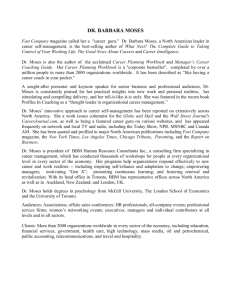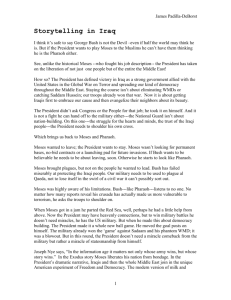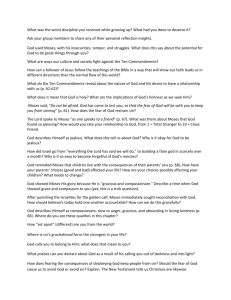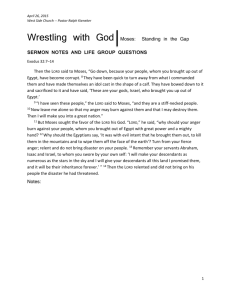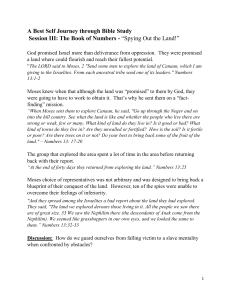God Encounter Exodus 3:1-10 (ESV) bible-sermons
advertisement
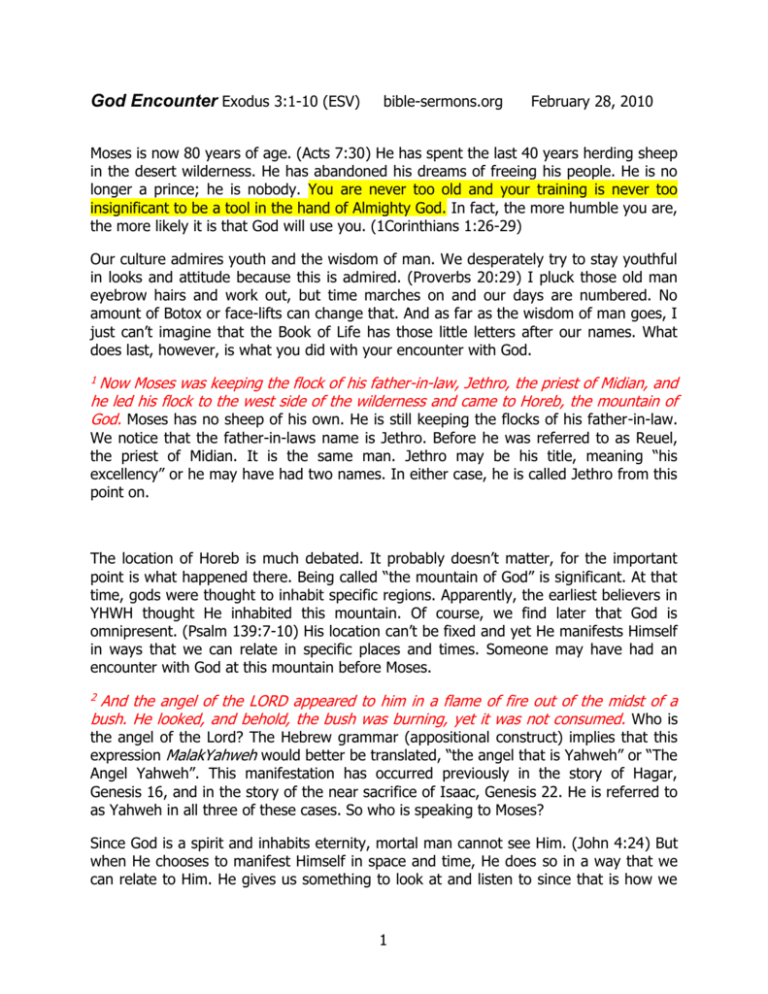
God Encounter Exodus 3:1-10 (ESV) bible-sermons.org February 28, 2010 Moses is now 80 years of age. (Acts 7:30) He has spent the last 40 years herding sheep in the desert wilderness. He has abandoned his dreams of freeing his people. He is no longer a prince; he is nobody. You are never too old and your training is never too insignificant to be a tool in the hand of Almighty God. In fact, the more humble you are, the more likely it is that God will use you. (1Corinthians 1:26-29) Our culture admires youth and the wisdom of man. We desperately try to stay youthful in looks and attitude because this is admired. (Proverbs 20:29) I pluck those old man eyebrow hairs and work out, but time marches on and our days are numbered. No amount of Botox or face-lifts can change that. And as far as the wisdom of man goes, I just can’t imagine that the Book of Life has those little letters after our names. What does last, however, is what you did with your encounter with God. Now Moses was keeping the flock of his father-in-law, Jethro, the priest of Midian, and he led his flock to the west side of the wilderness and came to Horeb, the mountain of God. Moses has no sheep of his own. He is still keeping the flocks of his father-in-law. 1 We notice that the father-in-laws name is Jethro. Before he was referred to as Reuel, the priest of Midian. It is the same man. Jethro may be his title, meaning “his excellency” or he may have had two names. In either case, he is called Jethro from this point on. The location of Horeb is much debated. It probably doesn’t matter, for the important point is what happened there. Being called “the mountain of God” is significant. At that time, gods were thought to inhabit specific regions. Apparently, the earliest believers in YHWH thought He inhabited this mountain. Of course, we find later that God is omnipresent. (Psalm 139:7-10) His location can’t be fixed and yet He manifests Himself in ways that we can relate in specific places and times. Someone may have had an encounter with God at this mountain before Moses. And the angel of the LORD appeared to him in a flame of fire out of the midst of a bush. He looked, and behold, the bush was burning, yet it was not consumed. Who is 2 the angel of the Lord? The Hebrew grammar (appositional construct) implies that this expression MalakYahweh would better be translated, “the angel that is Yahweh” or “The Angel Yahweh”. This manifestation has occurred previously in the story of Hagar, Genesis 16, and in the story of the near sacrifice of Isaac, Genesis 22. He is referred to as Yahweh in all three of these cases. So who is speaking to Moses? Since God is a spirit and inhabits eternity, mortal man cannot see Him. (John 4:24) But when He chooses to manifest Himself in space and time, He does so in a way that we can relate to Him. He gives us something to look at and listen to since that is how we 1 perceive things. The Apostle Paul tells us that the visible manifestation of the invisible God is Christ Jesus. (Colossians 1:20) For this reason, many of us believe that He was the pre-incarnate Christ that was speaking with Moses. He is both Lord and God. 3 And Moses said, "I will turn aside to see this great sight, why the bush is not burned." During those 40 years in the desert, Moses had likely seen lightening strike a tree or bush and seen it burn up. I’ve seen lightening strike a juniper tree near my home and watched into the night as it burned. It made me think of Moses. If that tree was still burning in the morning I was going to hike up the mountain to see it. Unlike Moses’ bush, the juniper was consumed. Moses’ bush just kept burning and burning. God got his attention. Children of God, remember God knows how to get your attention! Those who sincerely seek after God and long to follow Him with all their heart and soul often wonder if they missed something. Unless you are blatantly sinning, which hardens our spiritual ears, don’t worry about having missed something. (Deuteronomy 4:29) God knows how to get our attention. If there is something to be concerned about, it is obedience after we have heard what He is saying. (Deuteronomy 1:43) The fact that the bush was not consumed points us to God’s self-sufficiency. He did not need the bush. He does not need us. He is self-existent. Gregory of Nyssa in the fourth century commented on the bush not being consumed. He wrote, …what Moses saw in the burning bush was nothing less than "the transcendent essence and cause of the universe, on which everything depends, and alone subsists. (Colossians 1:17) When the LORD saw that he turned aside to see, God called to him out of the bush, "Moses, Moses!" And he said, "Here I am." God (Elohim) called to Moses! God is 4 speaking from a bush that is ablaze with His glory. The word that is used for bush, seneh, means a small bush of only a few feet in diameter. Why would God choose to manifest Himself in a little thorn bush? But then, maybe that is all there was other than rocks and grasses. In the Biblical world, bushes and trees sometimes represented people. I suspect that God may be saying that He can manifest Himself in anything He chooses, even in the life of broken down shepherd who has abandoned his hopes and dreams. Even in people like you and me. You can’t be too insignificant for God. Even if you are just a little thorn bush, you can become ablaze with the glory of God! He can use you to encourage others that God can work through them too. Get in His presence! Let Him light you up, and see how He can bring Himself glory through you. We must also note that God called Moses to Himself. Providence directed Moses’ steps to the place of the encounter. God brings us to Himself. (Proverbs 20:24) The double use of Moses’ name is a term of endearment in the Semitic culture. (Genesis 22:11;Acts 9:4) It implied friendship and affection. Moses would have been put at ease knowing the One in the fire was not there to judge him. Fire is a very significant manifestation. Many of the manifestations of God involve fire. There was the smoking firepot in the covenant with Abraham (Genesis 15:17), the pillar of fire that led the Israelites (Exodus 13:21), and the fire that came down on Sinai when Moses met with God (Exodus 19:18) to name a few. God is even called a consuming fire in Deuteronomy 4:24. Fire gives light but also consumes. It purifies and it can destroy. John the Baptist predicted that Jesus would baptize with the Holy Spirit and with fire. (Luke 3:16) The presence of God will not abide that which is evil. (Psalm 5:5) Then he said, "Do not come near; take your sandals off your feet, for the place on which you are standing is holy ground." When people presented themselves to Pharaoh, 5 they were required to enter without sandals. God uses our individual cultures to communicate in ways we understand. The mountain of God was not the only place God is, but Moses understood it as a place one encounters God. Taking off your shoes may be symbolic of not bringing the dirt of this fallen world before a pure and holy God, but Moses would have seen it as a sign of reverence and subservience when appearing before one that is vastly superior. No other place in Scripture makes this demand to take off one’s sandals. Even though Moses was addressed as a friend, he was to keep his distance. He is being taught about the holiness of God. God’s holiness requires respect and distance. We’ll see this again in Exodus 19. Boundaries are set around this same mountain where Moses will again meet with God. No living thing is to cross that boundary. It is the same idea as the veil that was before the Holy of Holies in the Temple. (Hebrews 9:3) Holy is a word that will appear again and again in Exodus. It is to be separated for Divine purposes. When applied to God, it means His “otherness”. It is that distance of Creator to creation. It is the infinite distance between Deity and humanity. (Hosea 11:9; 1Samuel 2:2) Because of the work of Jesus on our behalf, the veil in the Temple that separated us from God was torn and we can draw near to God. (Hebrews 10:19-22) We still come with reverence and awe, but we no longer need fear the wrath of God upon our sin. Jesus took that upon Himself. And he said, "I am the God of your father, the God of Abraham, the God of Isaac, and the God of Jacob." And Moses hid his face, for he was afraid to look at God. Now we 6 know we are talking about the God that Moses’ ancestors encountered as recorded in the book of Genesis. This is the God that made the covenant with Abraham and renewed it with Isaac and Jacob. This is the God that promised to bring them out of bondage after 400 years of being in a strange land. (Genesis 15:13-14) Moses covered his face. He knew that to look upon the full glory of God would mean the end of his physical life. It is just too much for our earthly bodies to take in. (Exodus 33:20) When people in the Book encounter God, it always comes with the realization of their utter unworthiness to be in His presence. There seems to come over people an understanding that their sinfulness demands judgment. (Isaiah 6:5) So how will we ever spend eternity in His presence? Again, it is because of what Jesus has done for us that we can stand in the judgment. Our resurrected bodies will be sinless and our souls purified that we might live in His presence. (Hosea 6:2) It is impossible for us to imagine what joy that will be. (Psalm 16:11) Then the LORD said, "I have surely seen the affliction of my people who are in Egypt and have heard their cry because of their taskmasters. I know their sufferings, Here, 7 those amazing words of the last chapter are repeated. God remembers His covenant (verse 6). He sees their affliction and hears their cry. He knows their suffering. What comfort these words should be to every child of God. This is God’s self-disclosure of His heart. Some would say that He is only that way toward His chosen people, the Jews. Well, take a peek into the future of the Jews and you can see He chose them as an example of unfaithful people. He chose them to show us His enduring and gracious love. He loves the world. (1John 3:16) We saw in John’s epistle that He is love. (1John 4:8) He cares about every hurting soul and unhealthy body. He will not always deliver us as He is about to deliver the Israelites, but He always sees. He always hears. He always knows what you are dealing with. You can be sure of that. Whatever happens in your life, know that God remembers His promises. Know that He sees your situation and hears your cry. Know that He knows all about it, every detail. and I have come down to deliver them out of the hand of the Egyptians and to bring them up out of that land to a good and broad land, a land flowing with milk and honey, to the place of the Canaanites, the Hittites, the Amorites, the Perizzites, the Hivites, and the Jebusites. 8 God was declaring the time had come. The 400 years was over. The sins of the people in the land of Canaan had reached the limit of God’s patience. They had passed the point of any possible return. (Genesis 15:16) To “come down” is an anthropomorphic expression, as if God inhabited some space above us. It means that He is about to act decisively in the affairs of men. It is a declaration that the transcendent God is about be seen in the immanent. He will act to deliver them from the Egyptians and bring them up out of the land. When God delivers, He not only takes us out of a place and conditions, but He brings us to a new place, a new space, if you will. There is a destination. He delivers us up out of sin and rebellion to loving obedience. He takes us out of our selfish mean spirited attitudes and into His loving sacrificial Spirit. (Ephesians 5:8) God always delivers from the evil to take us to the good. (1Peter 2:9) Keep in mind that this is not the end of trouble for the Israelites. Moses may have imagined a merry jaunt through the desert to the Promised Land, a couple of weeks of joyful caravanning, but that is not remotely close to the reality that was before him. Life is full of trouble. (Job 14:1) But it will be trouble of a different type. It will be trouble with a refining purpose. And now, behold, the cry of the people of Israel has come to me, and I have also seen the oppression with which the Egyptians oppress them. Of course God had heard the 9 cry of the people from the day they were enslaved, but the expression “has come up before me” tells us that it is now time for God to act. There is a time for everything. (Ecclesiastes 3:1) Moses was about 40 years early on his first effort. It was the right idea then but the wrong time and method. God always sees all things, but now the time has come to deal with the Egyptian abuse of the Hebrew people. (Hebrews 4:13) Now His seeing is inciting action. God’s Spirit is always striving with man, but there comes a time when He will strive no more. (Genesis 6:3) A line has been crossed, and there is no longer the openness to change in the heart of those with whom He is striving. That is when God takes action to deal directly with the situation. It is a warning to us to yield to God’s conviction so that we don’t have to face more severe forms of discipline. Come, I will send you to Pharaoh that you may bring my people, the children of Israel, out of Egypt." Moses is commissioned to do the task he had given up on. Now 10 he can do it God’s way. He has been humbled and trained in God’s Preparatory Academy for this moment. At 80 years of age, he is about to embark on one of the most remarkable stories in history. We know he is ready because he immediately tries to explain to God why He has the wrong man. Come, I will send you! It is the call of God to every little thorn bush who is humbled and ready to surrender to Jesus as Lord of their life. It’s a call to go to Him. He didn’t say, “Go!” He says, “Come!” because He is already there in the midst of the pain and suffering. (Matthew 4:19) He will lead us to that sick neighbor, that doubting relative, or that business acquaintance. Come I will lead you to be in this ministry, or serve in that capacity. Do you hear the call this morning? Did you hear it in prayer this weekend? Are you willing to hear it? “Come, follow me to…” let the Spirit fill in the blank. The Lord isn’t looking for a few good men, like in the Marine Corps. He is looking for a few broken people, common little ordinary thorn bushes that are willing to follow His lead, willing to be a vehicle for His fiery glory. Questions: 1 How did God prepare Moses for service? Reuel have another name? 3 Who is the angel of the Lord? 2 Why does 4 What is significant about God using a bush? 5 Why did God repeat Moses’ name? Who else? 6 Why does God appear as fire? 7 Why was Moses told to come no closer? And now? 8 What verbs does the Lord repeat? 9 What do they mean to you? 10 What does “come down” mean? 11 What comes after taking us out? 12 Why does God say “come” instead of “go”?


